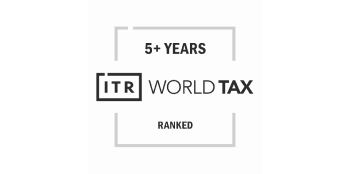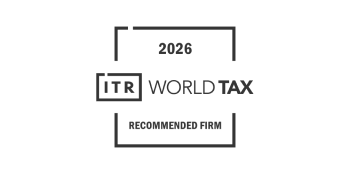


On December 19, 2024, the Federal Executive published the economic bill for the year 2025 in the Official Gazette of the Federation ("DOF"), which includes, among others, the "Initiative containing the Draft Decree to Amend,Add, and Repeal Various Provisions of the Federal Duties Law " and the "Initiative of the Federal Revenue Law for the Fiscal Year 2025" (hereinafter, the "Economic Bill for 2025").
The Economic Bill for 2025 does not contain amendments to the Federal Fiscal Code ("CFF"), the Income Tax Law ("LISR"), the Value Added Tax Law, or the Special Tax on Production and Services Law, and therefore, there will be no changes to these laws.
Additionally, no significant amendments are noted, in general, to the Federal Revenue Law ("LIF") or the Federal Duties Law ("LFD"), except for the increases in rates concerning mining duties further described, and the waiver of penalties, surcharges, and execution expenses related to contributions and compensatory fees for the fiscal year 2023 and prior, for individuals and legal entities meeting the requirements established in the LIF thereof.
Below are the items we consider most relevant from the Economic Bill for 2025.
Federal Revenue Law
Withholding rate for the financial system
For the purposes of withholding interest paidby the financial system to Mexican resident individuals and legal entities, the annual rate will remain at 0.50% on the capital amount for 2025, the same as for fiscal year 2024.
Surcharge rate
Regarding surcharge rates for extensions forthe payment of tax credits, the same percentages are maintained as in fiscal year 2024, according to the following:
Monthly Rate Concept
• 0.98% Extension on outstanding balances.
• 1.26% For payments in installments of up to 12 months.
• 1.53% For payments in installments of over 12 months and up to 24 months.
• 1.82% For payments in installments of over 24 months.
Fees and products
Regarding fees, it is anticipated that the fees authorized by the Ministry of Finance and Public Credit must be published in the DOF by the agencies requesting authorization for their collection.
Additionally, the inflation indexes applicable to fees and products which have not been specifically established for the 2025 fiscal year have been updated.
Reduction of penalties
The requirements for the reduction of penalties in charge of taxpayers amending their tax situation before or after the issuance of the final audit report or the observations notice remain as they are.
Tax incentives
In terms of tax incentives, the incentives previously granted during fiscal year 2024 are generally maintained. It is worth highlighting the following:
I. The tax incentive applicable to individuals engaged exclusively in agricultural or forestry activities, which allows them to request a refund of the special tax on production and services on the importation or acquisition of diesel or biodiesel and its blends, shall be applicable provided that they demonstrate to the Tax Administration Service that the fuel has been used in machinery destined to the aforementioned activities.
II. The tax incentives applicable to acquirers of fossil fuel used in their production processes which is not combusted, as well as the incentive granted to holders of mining concessions and assignments with annual gross revenues from the sale or disposal of minerals of less than 50 million pesos, consisting of the crediting of the special mining right paid in the relevant fiscal year, are maintained.
III. The maximum amounts to be distributed among applicants for the benefit provided in Articles 189 and 190 of the LISR applicable to national film and theater production and distribution is increased.
IV. The tax incentive applicable to high-performance sports set forth in Article 203 of the LISR, consisting of a tax credit equivalent to the amounts contributed for such purpose against the income tax liability and advance payments of the applicable fiscal year, is suspended.
V. A tax incentive is granted to individuals and legal entities with annual revenues not exceeding 35 million pesos, consisting of a 100% forgiveness of penalties, surcharges, and execution expenses related to own, withheld or transferred federal contributions, or compensatory fees administered or collected by the Tax Administration Service or the National Customs Agency, provided several requirements are met.
Measures to address natural disasters
Similarly, individuals subject to tax under Title IV of the LISR and whose households are located in areas affected by the earthquakes which took place on September 7 and 19, 2017, shall not consider the economic or monetary support received from legal entities or trusts authorized to receive deductible donations as taxable income, provided the support is used for there construction or repair of their homes.
As in fiscal year 2024, civil organizations and trusts authorized to receive deductible donations shall be deemed to fulfill their authorized social purpose when donating resources to organizations or trusts not authorized to receive donations under the LISR, which sole purpose is to carry out rescue and reconstruction work after natural disasters, provided certain legal requirements are met.
Deadline for cancelling tax Invoices
Pursuant to the LIF, invoices may be canceled no later than the last day of the month in which the annual income tax return of the fiscal year in which the invoice was issued must be filed, provided that the person in whose favor the invoice has been issued accepts the cancellation.
Primary sector
Finally, regarding individuals exclusively engaged in agricultural, livestock, forestry, or fishing activities whose income exceeds $900,000 pesos effectively obtained and who are subject to tax under the Simplified Regime, they shall only be subject to income tax on the excess of said limit.
Waiver of fines for certain taxpayers
A tax incentive is granted to individuals and legal entities whose taxable income in the relevant fiscal year has not exceeded $35 million pesos, through which 100% of penalties, surcharges, and execution expenses are waived, to the extent related to contributions and compensatory fees for the fiscal year 2023 and prior; they relate to taxpayers under a tax audit and for which the irregularities detected are amended no later than December 31, 2025; they relate to authorizations for payments in installments of outstanding crystallized tax credits maintaining an outstanding balance as of January 1, 2025 or; they relate to tax credits determined by the federal tax authorities, provided that such tax credits have not been challenged, or if so, the taxpayer withdraws from such means of defense.
This tax incentive is conditioned to complying with the requirements established in the LIF, which include, among others, not having been previously convicted for a tax crime, or having been included in published lists of taxpayers who did not successfully refute the imputations to them in the procedures established in Articles 69-B (issuance of tax receipts for nonexistent transactions) or 69-B Bis (improper transfer of tax losses) of the CFF.
Federal Duties Law
Migration duties
It is proposed that foreigners on board international cruise ships must cover the duties for the issuance of the visitor without permission migration document to perform remunerated activities.
Additionally, it is proposed that 67% of the income obtained from the collection of duties from the visitor without permission migration document to perform remunerated activities shall be allocated to the Ministry of National Defense to support its activities. The remaining 33% will not have a specific destination. Previously, these revenues were entirely allocated to the Tren Maya project.
Furthermore, it is proposed that 83% of the income obtained from the collection of migration services fees at airports related to international flight passengers shall be allocated to the improvement and modernization of the National Migration Institute, while the remaining 17% will not have a specific destination.
Mining duties
On May 8, 2023, the "Decree to Amend, Add, and Repeal Various Provisions of the Mining Law" was published in the DOF, amending the procedure for granting mining concessions and replacing the "free land and first applicant" scheme with public tenders.
Since the new procedure for granting mining concessions involves participation in a public tender rather than a request by the interested party, it is proposed to eliminate the duties for concession requests and instead establish a duty for the issuance of the mining concession title, which must be covered by the winner of the public tender process.
Regarding the special mining duty and the extraordinary duty, an increase from 7.5% to 8.5% and from 0.5% to 1% respectively, is proposed, resulting in a 100% increase of the latter, justified by the considerable recent growth of the sector and the increase in benefit to those extracting non-renewable resources from the Mexican State.
Airport duties
It is proposed that the resources obtained from the duties for the use, enjoyment, or exploitation of airports, calculated by applying a 9% rate to the gross income of concessionaires, shall be allocated 60% to the Ministry of National Defense and 40% to the Ministry of the Navy. Previously, this duty was already allocated to the aforementioned ministries, but the proportion was not specified.
Duties for the use, exploitation, or utilization of water
It is proposed to establish that as a requirement to reduce the acquisition costs associated with measurement devices and installation expenses related thereof from the duties to be paid, that such devices shall comply with the specifications issued by the National Water Commission.
Additionally, it is specified that taxpayers have the obligation to acquire measurement devices that comply with the specifications issued by the National Water Commission, as well as to calculate and pay the referred duties according to the readings of such devices.
Duties for the supervision by the National Banking and Securities Commission (transitory provisions)
Financial entities supervised by the CNBV, except for private banking institutions, may opt to pay the inspection and surveillance duty based on the quota provided for in 2024, increased by 4.5%, instead of the quota based on the provisions in force for fiscal year 2025. Further, financial entities incorporated in 2024 may opt to pay the minimum quota corresponding to fiscal year 2025 instead of the inspection and surveillance right.
Private banking institutions incorporated before 2024 may opt to pay a quota equivalent to the quota that they would have opted to pay in fiscal year 2024 increased by 10%, instead of the inspection and surveillance duty. Regarding private banking institutions incorporated in 2024, such institutions may opt to cover the minimum quota corresponding to 2025 instead of the inspection and surveillance duties.
Stock exchanges may opt to pay an amount equal to 1%of their equity instead of the inspection and surveillance duties.
It is clarified that taxpayers opting for these options and covering the annual payment during the first quarter of 2025 will not be eligible for the 5% discount established in the LFD.
Rights for concessionaires of frequency bands of the radio spectrum
Finally, concessionaires of frequency bands of the radio spectrum shall pay in 2025 the duties in force corresponding to 2024.
Tax Incentives in border regions
Although unrelated to the Economic Bill 2025, it is relevant to highlight that to date, no extensions have been made available so far to the Decree of tax incentives for the northern border region published in the DOF on December 31, 2018, nor to the Decree of tax incentives for the southern border region, published in the DOF on December 30, 2020, which will ceases to be effective after December 31, 2024.
These Decrees provide for the reduction of both ISR and VAT triggered by taxpayers earning income from business activities carried out exclusively in these regions.
For more information, please do not hesitate to contact our expert team.
Awards














